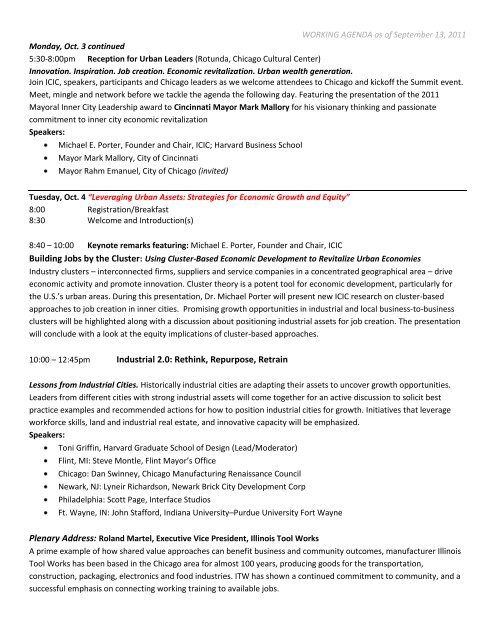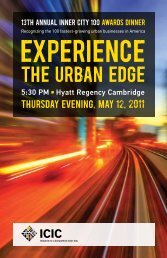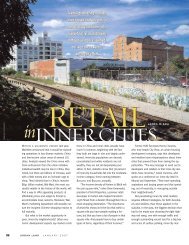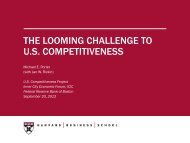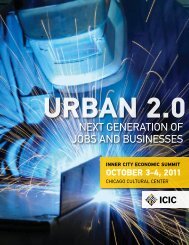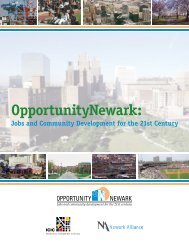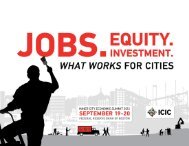Detailed Agenda - Initiative for a Competitive Inner City
Detailed Agenda - Initiative for a Competitive Inner City
Detailed Agenda - Initiative for a Competitive Inner City
You also want an ePaper? Increase the reach of your titles
YUMPU automatically turns print PDFs into web optimized ePapers that Google loves.
WORKING AGENDA as of September 13, 2011Monday, Oct. 3 continued5:30-8:00pm Reception <strong>for</strong> Urban Leaders (Rotunda, Chicago Cultural Center)Innovation. Inspiration. Job creation. Economic revitalization. Urban wealth generation.Join ICIC, speakers, participants and Chicago leaders as we welcome attendees to Chicago and kickoff the Summit event.Meet, mingle and network be<strong>for</strong>e we tackle the agenda the following day. Featuring the presentation of the 2011Mayoral <strong>Inner</strong> <strong>City</strong> Leadership award to Cincinnati Mayor Mark Mallory <strong>for</strong> his visionary thinking and passionatecommitment to inner city economic revitalizationSpeakers:Michael E. Porter, Founder and Chair, ICIC; Harvard Business SchoolMayor Mark Mallory, <strong>City</strong> of CincinnatiMayor Rahm Emanuel, <strong>City</strong> of Chicago (invited)Tuesday, Oct. 4 “Leveraging Urban Assets: Strategies <strong>for</strong> Economic Growth and Equity”8:00 Registration/Breakfast8:30 Welcome and Introduction(s)8:40 – 10:00 Keynote remarks featuring: Michael E. Porter, Founder and Chair, ICICBuilding Jobs by the Cluster: Using Cluster-Based Economic Development to Revitalize Urban EconomiesIndustry clusters – interconnected firms, suppliers and service companies in a concentrated geographical area – driveeconomic activity and promote innovation. Cluster theory is a potent tool <strong>for</strong> economic development, particularly <strong>for</strong>the U.S.’s urban areas. During this presentation, Dr. Michael Porter will present new ICIC research on cluster-basedapproaches to job creation in inner cities. Promising growth opportunities in industrial and local business-to-businessclusters will be highlighted along with a discussion about positioning industrial assets <strong>for</strong> job creation. The presentationwill conclude with a look at the equity implications of cluster-based approaches.10:00 – 12:45pm Industrial 2.0: Rethink, Repurpose, RetrainLessons from Industrial Cities. Historically industrial cities are adapting their assets to uncover growth opportunities.Leaders from different cities with strong industrial assets will come together <strong>for</strong> an active discussion to solicit bestpractice examples and recommended actions <strong>for</strong> how to position industrial cities <strong>for</strong> growth. <strong>Initiative</strong>s that leveragework<strong>for</strong>ce skills, land and industrial real estate, and innovative capacity will be emphasized.Speakers:Toni Griffin, Harvard Graduate School of Design (Lead/Moderator)Flint, MI: Steve Montle, Flint Mayor’s OfficeChicago: Dan Swinney, Chicago Manufacturing Renaissance CouncilNewark, NJ: Lyneir Richardson, Newark Brick <strong>City</strong> Development CorpPhiladelphia: Scott Page, Interface StudiosFt. Wayne, IN: John Staf<strong>for</strong>d, Indiana University–Purdue University Fort WaynePlenary Address: Roland Martel, Executive Vice President, Illinois Tool WorksA prime example of how shared value approaches can benefit business and community outcomes, manufacturer IllinoisTool Works has been based in the Chicago area <strong>for</strong> almost 100 years, producing goods <strong>for</strong> the transportation,construction, packaging, electronics and food industries. ITW has shown a continued commitment to community, and asuccessful emphasis on connecting working training to available jobs.


